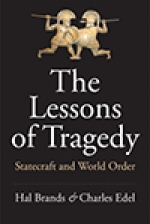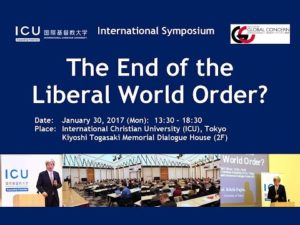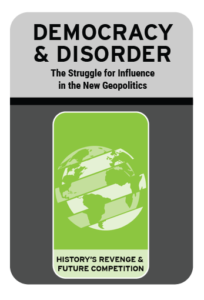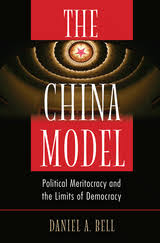 We are witnessing an intellectual transition to a worldview that is in equal parts “naïve, dangerous and ahistorical,” scholars Hal Brands and Charles Edel argue in a “brilliant” new book, notes Phillip Bobbitt. In “The Lessons of Tragedy: Statecraft and World Order,” they contend that we are losing that sensibility to our imminent and immense cost, he writes for The Wall Street Journal:
We are witnessing an intellectual transition to a worldview that is in equal parts “naïve, dangerous and ahistorical,” scholars Hal Brands and Charles Edel argue in a “brilliant” new book, notes Phillip Bobbitt. In “The Lessons of Tragedy: Statecraft and World Order,” they contend that we are losing that sensibility to our imminent and immense cost, he writes for The Wall Street Journal:
Although one admires the clarity of this analysis, one can’t help questioning whether what has happened in recent years is a refusal to see what is required to defend the values of freedom, democracy, the rule of law and human rights—or whether it is adherence to the values themselves that is changing. Many countries have begun the transition from industrial nation-states, a constitutional order that dominated the 20th century, to informational market states that achieve legitimacy by maximizing wealth and opportunity.
Because changes in the constitutional order inevitably bring about changes in the international order, this shift will have profound consequences for war and peace, Bobbitt adds:
It will be more important than ever to develop public goods such as loyalty, civility, trust in authority, respect for family life, reverence for sacrifice and admiration for political competence—public goods that the market is not well-adapted to creating and maintaining. It is no coincidence, by the way, that the international achievements of the postwar order that Americans were so influential in sustaining were also “public goods.”
 The erosion of the international order seems rooted in a decline in the resilience of states, argues analyst Hanns W. Maull. The liberal international order has taken several forms during its long history, he writes for Survival:
The erosion of the international order seems rooted in a decline in the resilience of states, argues analyst Hanns W. Maull. The liberal international order has taken several forms during its long history, he writes for Survival:
- Its first incarnation, which might be called ‘LIO 1.0’, was orchestrated by the United Kingdom in the nineteenth century. It was built on the principles of equality among sovereign states (but also colonialism), free trade and capital flows, and the gold standard.
- A second incarnation (LIO 2.0) emerged from the settlement of the First World War. After the failure of the League of Nations in the 1930s, this order was reworked, mainly by the United States and the United Kingdom, during and immediately after the Second World War. Its principles and norms were first spelled out in the Atlantic Charter, and later in the foundational documents of the United Nations and the Bretton Woods institutions.
 A careful assessment of the underlying principles and norms of the liberal international order reveals two important differences between LIO 2.0 as it was conceived in the mid-1940s and the order that was built on its foundations from 1990, he contends in The Once and Future Liberal Order:
A careful assessment of the underlying principles and norms of the liberal international order reveals two important differences between LIO 2.0 as it was conceived in the mid-1940s and the order that was built on its foundations from 1990, he contends in The Once and Future Liberal Order:
- Firstly, the foundational principles of the two systems do not match up.24LIO 2.1 was characterised by a significant expansion of the normative liberal agenda to include human-rights and environmental concerns. Yet LIO 2.0 had emphasised social fairness and full employment, a norm that was tacitly dropped in the 1990s, presumably reflecting the influence of neoliberal thinking.25 This was to become the Achilles heel of LIO 2.1: Western democracies were to pay a steep political price for their neglect of national integration and social cohesion, which had rightly been a core concern in the 1940s.
- Secondly, the commitment to the principles and norms espoused by LIO 2.1 was in practice less impressive than it may have seemed at the time. A number of regimes in formerly communist countries, but elsewhere too, were privately loath to subscribe to the values expressed in the Paris Charter, but preferred not to voice those doubts publicly. Perhaps more importantly, the commitment of Western societies and their elites to those principles, which was never completely
 above a charge of hypocrisy, was revealed as hollow by the demise of Lehman Brothers and its worldwide repercussions in 2008.
above a charge of hypocrisy, was revealed as hollow by the demise of Lehman Brothers and its worldwide repercussions in 2008.
“If the international order is to retain (or regain) its liberal credentials – in the sense not just of being economically open but also politically democratic and human-rights-based – the Western democratic model of governance will have to find a way to compete with alternative models, notably the efficient, technologically supported authoritarian system promoted by Beijing,” Maull concludes. RTWT







